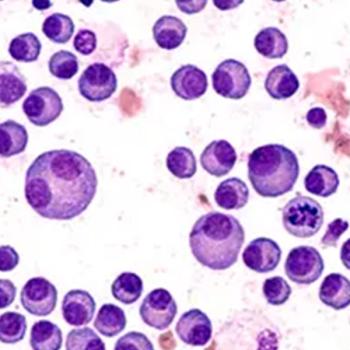
Certepetide has been granted orphan drug designation by the FDA for the treatment of patients with cholangiocarcinoma.

Your AI-Trained Oncology Knowledge Connection!


Courtney Flaherty joined OncLive as an assistant editor in October 2022. Leveraging an educational background in the life sciences and prior experience conducting interviews in a university setting, she plays a key role in shaping social media strategy, covering live conferences, and producing multimedia content for both print and digital platforms. Email: cflaherty@onclive.com

Certepetide has been granted orphan drug designation by the FDA for the treatment of patients with cholangiocarcinoma.

Sujith Samarasinghe, BSc, MBBS, MRCPCH, FRCPath, PhD, discusses the use of blinatumomab in children with Down syndrome acute lymphoblastic leukemia.

Jennifer R. Eads, MD, explains the relevance of negative results from the ECOG-ACRIN EA2174 trial in esophageal/gastroesophageal junction adenocarcinoma.

The supplemental new drug application for fruquintinib plus paclitaxel in second-line gastric cancer in China has been voluntarily withdrawn.

Consuelo Bertossi, MD, discusses research elucidating the role and prognostic significance of TP53 mutations in chronic lymphocytic leukemia.

Ankit Mangla, MD, expands on early data from the RELATIVITY-048 trial evaluating a triplet immunotherapy regimen in untreated advanced melanoma

Ankit Mangla, MD, expands on key survival data from the phase 2/3 RELATIVITY-047 trial in previously untreated, unresectable, or metastatic melanoma.

Saranya Chumsri, MD, and Adam M. Brufsky, MD, PhD, discuss the evaluation of Bria-IMT plus a checkpoint inhibitor in metastatic breast cancer

Amivantamab plus chemotherapy has received European approval for EGFR-mutant non–small cell lung cancer that progressed on an EGFR TKI.

Jason A. Mouabbi, MD, discusses shifting standards for HER2 testing for T-DXd administration and areas of ongoing ADC development within breast cancer.

Jason A. Mouabbi, MD, discusses novel endocrine and targeted therapies that may overcome CDK4/6 resistance in HR-positive, HER2-negative breast cancer.

Jason A. Mouabbi, MD, discusses novel endocrine and targeted therapies that may overcome CDK4/6 resistance in HR-positive, HER2-negative breast cancer.

Males harboring BRCA1/2 pathologic variants have a higher risk of developing select cancers but are less likely to undergo genetic testing.

Suzanne Lentzsch, MD, PhD, discusses updated data from the LINKER-MM1 study of linvoseltamab in relapsed/refractory multiple myeloma.

Durvalumab plus chemotherapy, then durvalumab with or without olaparib, was approved in Europe for select advanced/recurrent endometrial cancer.

Manali Kamdar, MD, discusses responses with liso-cel according to prior lines of therapy and BTK inhibitor exposure in mantle cell lymphoma.

Erika P. Hamilton, MD, discusses the implications of the DESTINY-Breast06 trial for patients with HER2-low and -ultralow breast cancer.

High pCR rates were observed for patients with uncommon breast cancer subtypes who received response-predictive subtype–optimized therapy.

Olomorasib plus pembrolizumab demonstrated responses in first-line metastatic KRAS G12C–mutant non–small cell lung cancer.

Kashul Parikh, MBBS, discusses research efforts dedicated to leveraging antibody-drug conjugates with varying targets in lung cancer.

Julie M. Vose, MD, MBA, discusses results with epcoritamab from the follicular lymphoma cycle 1 optimization cohort of the phase 1/2 EPCORE NHL-1 trial.

Kaushal Parikh, MBBS, highlights how PD-L1 expression affects treatment decision-making in the absence of other targetable mutations or prognostic indicators in non–small cell lung cancer.

Kaushal Parikh, MBBS, discusses treatment advances in early-stage NSCLC including for patients with actionable mutations, and details considerations with adjuvant approaches.

The BCMA/CD19–targeted CAR T-cell therapy GC012F was safe and produced favorable outcomes in newly diagnosed multiple myeloma after induction therapy.

The FDA has granted priority review to asciminib for newly diagnosed Philadelphia chromosome–positive chronic myeloid leukemia in chronic phase.

Paolo Tarantino, MD, discusses current treatment landscapes and looks to the future in HER2-low breast cancer, HER2-positive breast cancer, and TNBC.

Jonathan W. Riess, MD, MS, and James Chih-Hsin Yang MD, PhD, debate the benefits of upfront osimertinib with/without chemotherapy in EGFR-mutant NSCLC.

The FDA has accepted the resubmission of a BLA for cosibelimab in advanced or metastatic cutaneous squamous cell carcinoma.

Paolo Tarantino, MD, discusses questions about the optimal sequencing of antibody-drug conjugates in endocrine-refractory, HR-positive breast cancer.

The ROR2-targeted ADC ozuriftamab vedotin has received FDA fast track designation in recurrent or metastatic head and neck squamous cell carcinoma.